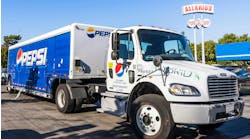Fuel prices have headed into uncharted territory. And from the looks of it, no one really knows why or whether they're going to stay at these incredible levels, if not keep climbing.
After leveling off and even dropping a bit at the beginning of the year, all of a sudden in mid-February diesel prices started climbing 4% or more every week. By the middle of March, the average price of diesel nationally was just under $4/gal., and had actually crossed that psychologically shocking mark in many regions.
The average price in mid-March a year ago was $2.68, meaning you've been hit with a 50% increase in the largest element of your operating costs. Translated into real-world terms, a general freight carrier was spending 18.37¢/mi. on diesel in 2002, according to benchmarking numbers from the American Trucking Assns. Late last month, fuel costs for that same operation were 48.37¢/mi.
The sudden increase this year in diesel is to a large extent tied to a run-up in the price of crude oil, which went as high as $110 a barrel in mid-March and is continuing to flutter around the $100 mark. So the logical question is, why the jump in crude prices?
Supply shortages coupled with high demand is the usual explanation when oil and fuel prices spike. Some market analysts point to the economic growth of China and India driving world demand for oil as the culprit. But there's plenty of oil on the market right now, more than enough to go around. In fact, oil consumption in the U.S. — the world's largest consumer — is down a substantial 3% and likely to remain down.
As for diesel, and to a lesser extent gasoline, there is no supply shortage for the refineries or distribution networks to blame for the price increases. With spring weather here, demand for heating oil in the Northeast is dropping, which normally means similar fuels like diesel will begin to drop in price.
One new theory is that the weak dollar is responsible for the new highs in crude oil prices. The reasoning goes that with crude prices tied to the dollar and the dollar worth less, international oil producers need more dollars per barrel just to break even. The problem with that line of reasoning is U.S. domestic oil production accounts for about 40% of the oil we consume, which means prices for that oil should be unaffected by lower dollar values, or at least greatly dampen the effect on the global market.
Finally, there's the theory that greedy commodities traders are artificially driving up crude prices to create enormous profits for themselves at the expense of everyone else. If we've learned anything about the free market, it's that speculation leads to bubbles that deflate under their own artificial weight. And the more extreme the speculation, the faster we reach the bubble's bursting point. Where are the signs that oil prices are going to plummet? Do you hear anyone predicting a return to $50-a-barrel crude? Or even $75?
There's probably a bit of truth in each of those lines of reasoning. But whether we understand the causes or not, the bottom line is you can't do much about the price you're paying for fuel. The only thing you can control is your fleet's unnecessary consumption of that high-priced commodity. I'll save that discussion for next month.
E-mail: [email protected]
Web site: fleetowner.com


